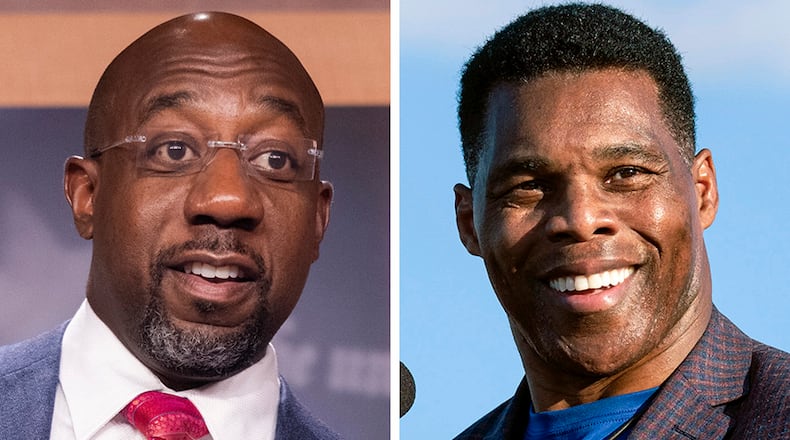When U.S. Sen. Raphael Warnock and Herschel Walker reported their massive fundraising hauls last week, they weren’t just two candidates raising huge sums of money in Georgia.
They were two Black men in the Deep South busting campaign cash records in the race for U.S. Senate. Building on Stacey Abrams’ 2018 fundraising dominance, and taken together with multiple Black candidates in competitive races, 2022 is proving to be a breakthrough fundraising year for Black candidates in Georgia.
Warnock reported last week that he raised $13.6 million in the first three months of the year, more than any Senate candidate in history in the same time frame. He ended the quarter with $25.6 million in the bank.
Walker, for his part, reported raising $5.5 million for the quarter, dwarfing his four GOP rivals and bringing his total to more than $10 million raised for his campaign to challenge Warnock in November.
Along with Warnock and Walker, candidates of color up and down the ticket have posted fundraising results this year outpacing white candidates in the same races.
The leader of the pack, of course, was Stacey Abrams, who blasted out of the gates in her follow-up governor’s race by raising $9.2 million in the first two months of her campaign. That was $2 million more than Gov. Brian Kemp raised in six months for his own reelection race and exponentially more than former Sen. David Perdue’s primary challenge to Kemp. Perdue, a wealthy former CEO, raised just over $1 million in his first reporting period.
It’s not just the statewide races where Black candidates are making their mark. U.S. Rep. Lucy McBath is outraising U.S. Rep. Carolyn Bourdeaux in the 7th District, with $2.9 million in the bank compared to Bourdeaux’s $2.1 million in cash on hand.
Even more notable were Black candidates in two of Georgia’s most conservative congressional districts.
Army veteran Marcus Flowers, a Democrat, outraised U.S. Rep. Marjorie Taylor Green in her solidly conservative northwest Georgia district, with an astonishing $2.4 million raised in the first three months of 2022, compared to her $1.1 million. (Greene still has about $1 million more than Flowers in cash-on-hand and remains the overwhelming favorite in that race.)
Finally, in the 10th Congressional District east of Atlanta, former Democrat and current Trump-favorite Vernon Jones outraised his GOP primary competition in the first three months of the year, fueled by a Mar-a-Lago fundraiser hosted by Trump. Jones still lags behind trucking executive Mike Collins in cash-on-hand, but the money alone could help Jones make it a two-man race.
Fundraising is tough for just about every candidate. But it’s historically been harder for minority candidates, especially in the Deep South. Traditional sources of money like deep-pocketed friends and family were mostly available to traditional candidates — namely white men.
But a combination of online fundraising, social media, and Georgia’s new status as a battleground state have combined to change the rules for all candidates. Black candidates, in particular, have been able to harness those changes to fuel their own campaigns.
Steve Leeds was on the national finance committee for Barack Obama in 2008. He points to that race, and Obama’s ability to expand the field for voters and donors as a sea change for Black candidates nationally.
“I think you have to look at Obama as being the real first person to have broad political contributions and a whole new wave of engaged people,” Leeds told me, “What we have seen since then is a growth of that by magnitude.”
Kristin Oblander has been a leading Democratic fundraiser in Georgia for the last 30 years, including for the late U.S. Rep. John Lewis.
She said changes in technology, in particular, have democratized candidates’ ability to spread their message and ask for donations, which had been especially helpful to candidates of color.
“Before it had been the more traditional fundraising, tapping into your personal professional networks, and that could be considered rather clubby,” she said. Digital fundraising for small-dollar donors also created a whole new way to make their voices heard.
“That’s almost how people vote, in a way,” she said. “Raphael Warnock had almost 200,000 people give him an average of $40. That’s not a club that’s a movement.”
While being able to raise money is crucial, even a huge pot of cash doesn’t guarantee a win.
In 2020, Jaime Harrison raised an astounding $57 million in his challenge to U.S. Sen. Lindsey Graham in South Carolina. But Harrison, a longtime staffer to U.S. Rep. James Clyburn, still lost to Graham in the end.
But so far in the 2022 cycle, more and more Black candidates in Georgia are setting themselves up for top-tier races in November.
Walker has told the story several times in interviews that one of the first questions he was asked by D.C. insiders in the run-up to his campaign was “Can you raise the money?”
The answer has been yes, he can raise the money. Can he win? That’s a question for another day.
About the Author
Keep Reading
The Latest
Featured




